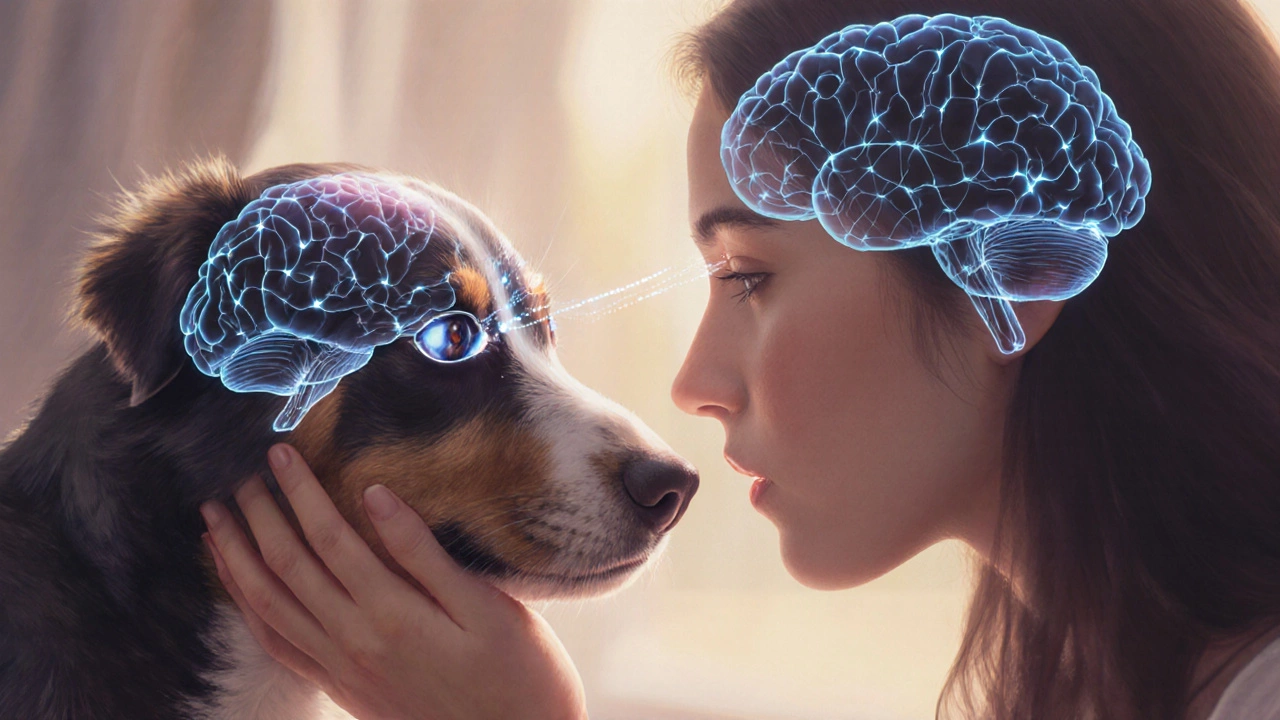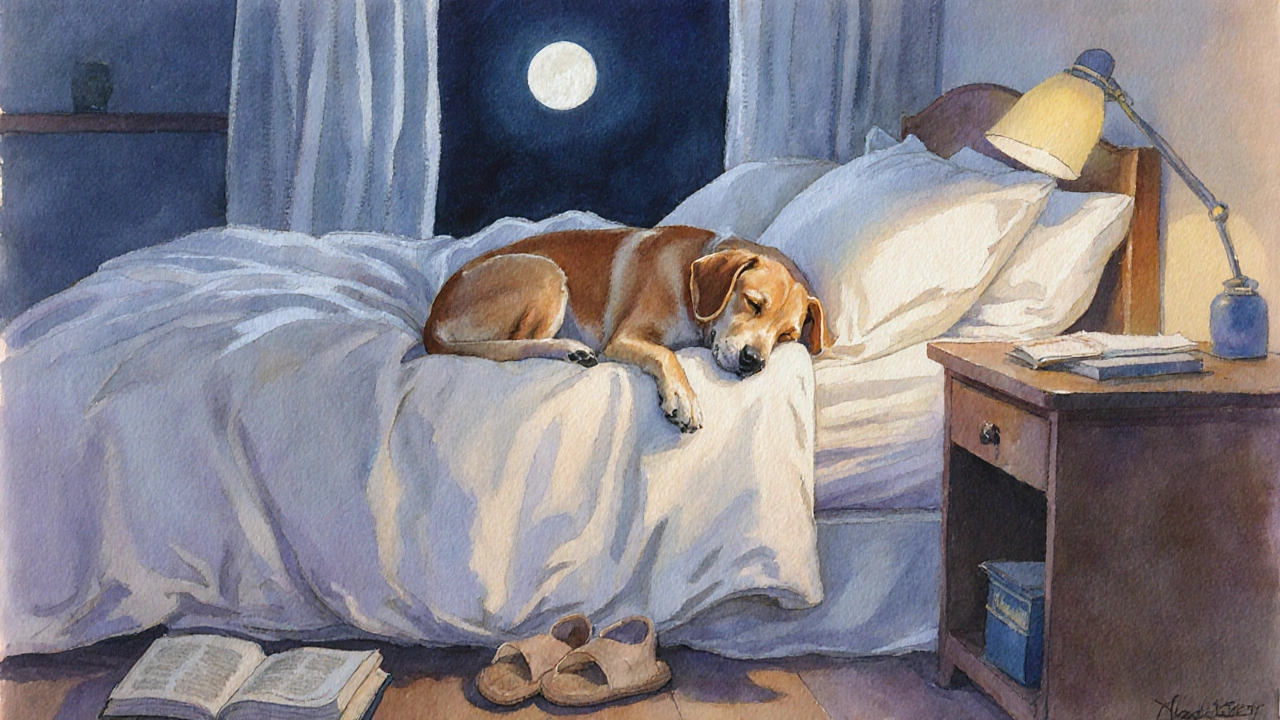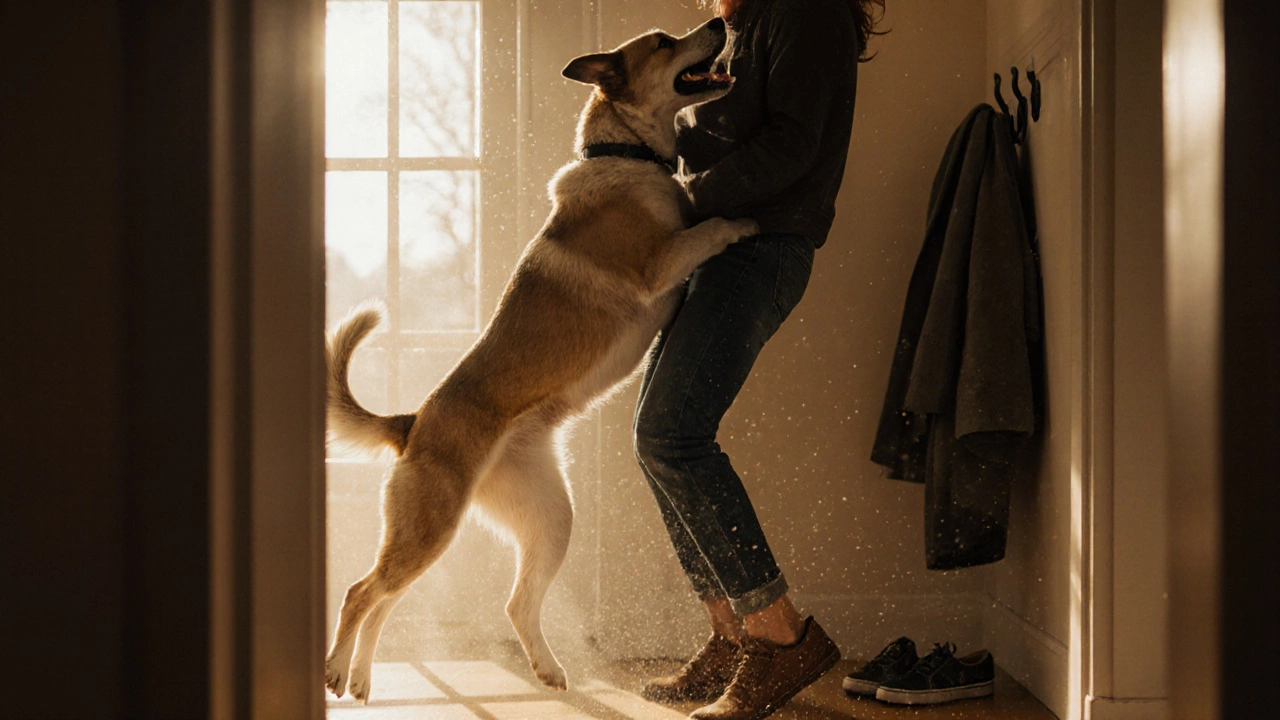Ever come home after a long day and your dog crashes into you like a furry tornado, tail wagging like a propeller, eyes wide with pure joy? You scratch behind their ears, and they sigh like they’ve just won the lottery. You might wonder-do they really know how much you love them? Or are they just happy because you’ve got treats in your pocket?
The truth is, your dog doesn’t need words to understand love. They feel it in your touch, your tone, your routine. Science shows dogs don’t just tolerate us-they form deep emotional bonds with us, similar to how babies bond with their parents. This isn’t just cute behavior. It’s biology.
Your Dog’s Brain Lights Up When You’re Near
In 2014, researchers at Emory University trained dogs to stay still in an MRI machine-no sedation, no force. They showed the dogs smells of their owners, strangers, and other dogs. When the dogs smelled their human, the caudate nucleus in their brain lit up. That’s the same area that activates in humans when we feel love, reward, or anticipation of something good.
That’s not a fluke. Dogs don’t respond to just any human. They respond to their human. The more time you spend together, the stronger that brain response becomes. It’s not about food. It’s about connection. Your dog’s brain literally associates you with safety, comfort, and joy.
They Read Your Face Like a Book
Dogs are the only non-primate animals that look humans directly in the eyes to communicate. Wolves don’t do this. Chimpanzees don’t do this. But dogs? They’ve evolved to read our faces like we read text messages.
Studies show dogs can distinguish between a happy face and an angry one-even when shown only half a face. When you smile at your dog, they mirror your expression. Their eyebrows lift. Their ears perk. Their whole body softens. It’s not mimicry for reward. It’s empathy.
And when you’re sad? They know. Dogs respond to human crying more than to other sounds. They don’t just come over-they nudge you, lick your hand, or lie down right next to you. They’re not trying to fix your mood. They’re just saying, “I’m here.” That’s love.
They Miss You-More Than You Think
Ever leave for work and your dog looks like you just abandoned them? That’s not guilt. That’s grief.
Researchers at Eötvös Loránd University in Hungary found that dogs show signs of separation distress that match the emotional intensity of a child separated from a parent. Their heart rates spike. They pace. They whine. They stare at the door. And when you walk through the door? Their cortisol levels drop within seconds. You are their emotional anchor.
One study tracked dogs’ behavior when their owners left for 30 minutes. When they returned, the dogs didn’t just greet them-they spent more time looking at them than at food, toys, or other people. They chose you over everything else. That’s not training. That’s attachment.

Love Isn’t Just in the Big Moments
You might think love means long walks, fancy toys, or weekend trips to the beach. But your dog doesn’t measure love in grand gestures. They measure it in consistency.
- The way you say their name in the morning
- The way you pause before eating to give them a tiny bite
- The way you rub their belly even when you’re tired
- The way you let them sleep on the foot of your bed
These small, repeated actions build trust. And trust is the foundation of love. Dogs don’t need expensive gifts. They need to know you’ll be there-every day, in every way.
They Remember Your Voice, Your Smell, Your Rhythm
Dogs have an extraordinary memory for people. Not just faces. Not just names. But the rhythm of your footsteps, the scent of your shampoo, the way you hum when you’re cooking.
When you’re gone for a few days, your dog doesn’t forget you. They wait. They lie by the door. They sniff your shoes. They check your pillow. When you come back, they don’t just wag their tail-they tremble. That’s not excitement. That’s relief. That’s love.
There’s even a phenomenon called “social referencing.” When your dog is unsure about something-a loud noise, a new person-they look to you. Not to see if you’re scared. To see if you’re calm. Your emotional state tells them whether the world is safe. You are their compass.

Love Is a Two-Way Street
It’s easy to think dogs love us because we feed them. But that’s backward. Dogs love us because we give them something no other animal can: belonging.
They don’t see you as a provider. They see you as family. In dog social groups, pack members groom each other, sleep together, and defend one another. Your dog does all of that with you. They lick your face. They curl up beside you. They guard your space. That’s pack behavior. That’s love.
And here’s the quiet truth: your dog doesn’t just love you. They need you. In a world full of noise, chaos, and uncertainty, you are their calm. Their safe place. Their reason to get up in the morning.
What You Can Do Right Now
You don’t need to buy anything. You don’t need to plan a trip. You just need to be present.
- Look them in the eyes for 30 seconds-no distractions, no phone.
- Stroke their head slowly, not just behind the ears.
- Say their name softly when they’re quiet, not just when you want them to come.
- Let them sleep wherever they want-even if it’s on your pillow.
- Don’t punish them for being excited when you come home. Let them celebrate you.
These aren’t tricks. They’re rituals of connection. And your dog? They’ll remember them longer than you think.
They Don’t Say ‘I Love You’-But They Say It Every Day
Your dog won’t write you a letter. They won’t say ‘I love you’ in words. But they show it in the way they wait for you. In the way they rest their head on your knee. In the way they follow you from room to room, even when there’s nothing to do.
They love you not because you’re perfect. Not because you’re rich. Not because you’re the best dog owner on the block. They love you because you’re theirs. And they’re yours.
So yes. Your dog knows you love them. And they love you back-more deeply, more faithfully, and more purely than almost anything else on this planet.
Can dogs really feel love, or are they just being obedient?
Dogs don’t love because they’re trained. They love because their brains are wired to bond with humans. Studies using MRI scans show the same brain regions light up in dogs when they see their owners as in humans when they feel love. This isn’t obedience-it’s attachment. Dogs form emotional bonds similar to parent-child relationships.
Do dogs understand when I say ‘I love you’?
Dogs don’t understand the words ‘I love you’ the way humans do. But they understand the tone, the rhythm, and the emotion behind them. If you say it gently while petting them, they’ll associate it with safety and affection. They respond more to how you say it than what you say.
Why does my dog stare at me so much?
When your dog stares at you, they’re releasing oxytocin-the same bonding hormone humans release when hugging or looking into each other’s eyes. This is called the ‘oxytocin loop.’ Mutual gazing strengthens your bond. It’s not about wanting something. It’s about connection.
Do dogs miss me when I’m away?
Yes. Dogs experience separation anxiety that mirrors human grief. Their heart rate increases, they pace, and they wait by the door. When you return, their cortisol levels drop immediately. They don’t just miss you-they rely on you emotionally. Your absence affects their stress levels.
Can a dog love more than one person?
Yes, dogs can bond with multiple people, but they usually have one primary attachment-the person who feeds them, plays with them, and spends the most consistent time with them. That person becomes their emotional anchor. Other people are trusted, but not always deeply bonded to.
What if my dog seems distant? Does that mean they don’t love me?
Not necessarily. Some dogs are naturally quieter or more reserved. Trauma, illness, or changes in routine can also make them seem distant. If your dog used to be affectionate and suddenly isn’t, check for health issues or stress. But if they’ve always been calm, they may show love in subtle ways-like following you quietly or resting near you without demanding attention.
